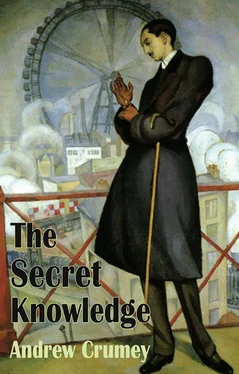Adorno glances at his watch. “This is most… unusual.”
“I see that you are doubtful of my story. And you are right to be — for it was built on a lie. Louis always kept from me the secret knowledge that he said could only harm me, but when he passed away I felt as though my own life were no longer worth living. Come now, damned conspirators, I said to myself. Come and kill me, but before I die I shall unlock the code, break the spell of fear itself. I knew where the book was kept, knew the combination of the safe. Louis had forbidden me from opening it and I had obeyed, but now what else was I to do? So I brought it out into the light of the day, the slender volume that Walter Benjamin thought could save his life, as well as other papers stored with it. I sat at Louis’ desk and looked at those cursed documents. And I realised at once: I had been deceived.”
“What did you see?”
“First the book, written in some unknown language and peppered with symbols, hieroglyphs; it was no cipher but was itself in code. Why had this confused jumble been kept hidden from me? What might I have learned from it? Only that it was meaningless. But more than the book, it was the other papers that drew my attention, for what I had before me were notes for Pierre’s work, sketches and drafts. Surely my husband must have retrieved these from the composer’s desk along with the score, for a moment this was what I thought. But the pages told a different story. Mingled with musical notation there were verbal comments, suggestions, mathematical equations. The handwriting was not Pierre’s. I even retrieved the letters I still kept from him, in order to verify what was so immediately obvious to me.”
“He could have worked with an assistant.”
“No, professor, there was no assistant. Because you see, I recognised the handwriting at once. I told myself it couldn’t be true, yet there was no other explanation. The man who wrote those words was my husband. Certainly there was another hand at work in the drafts, another style of writing, but when I examined it all closely, so very closely, I understood what had gone on. As well as Pierre’s letters I revisited the most sacred item of all, the score. And like a detective, with a magnifying glass in my hand, I discovered what I knew must be the truth. The work was a forgery. My husband, Louis Carreau, cobbled it together as a way of winning me for himself. He said he knew Pierre, this much I believe is true, and he must have seen his writing, practised until he was able to replicate it, penned what looks like an entire piece of music and claimed to have taken it from Pierre’s desk. Made me hide it, so that in all the years I never heard it. I expect it would be only crude noise. Poor Louis had no ear for music.”
“Surely you must hate him for it.”
“I pity him. He saved me from my misery after Pierre died, but that was not enough, instead he felt the need to invent some other kind of salvation, more tangible and persuasive, that would bind us together. A great hoax reinforced by so many strange incidents over the decades, obscure items he acquired. And I never suspected a thing, because from the very start, Louis had done what would make his story most convincing, he had created the essential piece of material evidence that would extinguish all doubt. Some women lose a husband and discover he had another wife and home, another life, making a mockery of the love they claimed to feel. But when I discovered how I’d been deceived, it had the opposite effect. He did it all for me, because he thought he had to. He simply couldn’t believe that I might love him only for what he was, for the good and pure heart that he had. How I miss the years of happiness we might have shared.”
Adorno imagines the aftermath of his own death, Gretel reading every letter, recognising every name, being surprised by nothing. “Your story is a tragic one.”
“The word is overused. They say your friend Benjamin was tragic; others might call his demise typical.”
“He made a fatal error.”
“He was a fool, like Louis.”
Adorno finds it a wise and admirable comment, but also deduces that the woman’s late husband was not wholly wrong in doubting the possibility of love. “I thank you for this interesting piece of history, now I ought to return to my work.” He begins to rise, Yvette holds his arm.
“I admit my story is bizarre and you had no need to hear it. But I wanted to speak of Walter Benjamin. The book he gave my husband is real.”
“You thought it nonsense.”
“Whatever it is, wherever it came from, even when we discard my husband’s deceptions, it remains the fact that your friend carried the book over the Pyrenees; for him it was equivalent to life itself. I should like you to have it. To me it means nothing.”
“And to me it should mean more?”
Yvette looks sadly at the bright water of the pond. “If you will not receive what I am offering then I shall destroy it. I suppose it has no place in the archive of Benjamin’s papers, but perhaps he might have liked you to have what cost him so much effort.”
Adorno considers the strange proposal; a gift that focuses with startling clarity the nullity of all gifts, their purely symbolic value, where what is symbolised is always an exchange, because the gift has to be accepted as well as given. This poor woman’s life has been an illusion, her marriage a sham, her love affairs counterfeit. His acceptance would amount to telling her: it has not been wasted.
“Send it to me,” he says, giving her his card. Then he bids farewell to Yvette Carreau, leaving her sitting on the bench where she watches the ducks, looking now like the old woman she always was. He walks away and forgets her. Already he’s late for an encounter with Ulrike at her apartment.
The package arrives at his home the following day. Wrapped in brown paper he finds the slim, elegantly bound volume the Frenchwoman described; also some Xeroxed pages of musical manuscript and an accompanying note explaining them to be the work she spoke of. She knows it to be a fake, she writes, yet still cannot part with the original that has been her trusted companion for so many years.
Adorno leafs through the book, whose age and provenance only a specialist could determine. It is, as she said, written in some form of invented language, incorporating tables, diagrams and symbols one could guess to be mathematical or magical (categories indistinguishable except to the initiated). A frequently recurring mark resembling the Greek letter psi could equally be a pitchfork; Adorno suspects the work to be a coded treatise on demonology or the Kabbalah, topics upon which Benjamin allowed his intellectual energies to be squandered.
Yet there is no evidence at all, other than the widow’s tale, that this book ever lay within his friend’s possession. Adorno puts it aside and considers the score, allegedly the fabrication of an unmusical man. A moment’s perusal throws doubt on that, for Adorno can see at once that it is not randomly written noise, but a credible composition. If Louis Carreau forged this then he must have worked from some original model, perhaps several. Adorno takes it to the piano, arranges the pages, and begins to play.
The style is instantly recognisable; it is certainly a piece that belongs to the first decade of the twentieth century. The revolution of serialism has not yet happened; there is perhaps something of Scriabin in it, or Stravinsky. And Adorno reminds himself: this is supposed to be a fake. Louis Carreau was no artist, but he must have had some understanding of what he pieced together from unknown sources. One could almost say there is a hint of Ravel, only a hint. And my word, a thinly concealed quotation from Beethoven.
All of it pastiche, apparently — for the love of a woman! This Carreau was a sensitive soul, poor Yvette doesn’t know how lucky she was to find him. The man who will build an entire world of falsehood around his beloved, surely that man is rare. More common is he who covers his own false life.
Читать дальше











